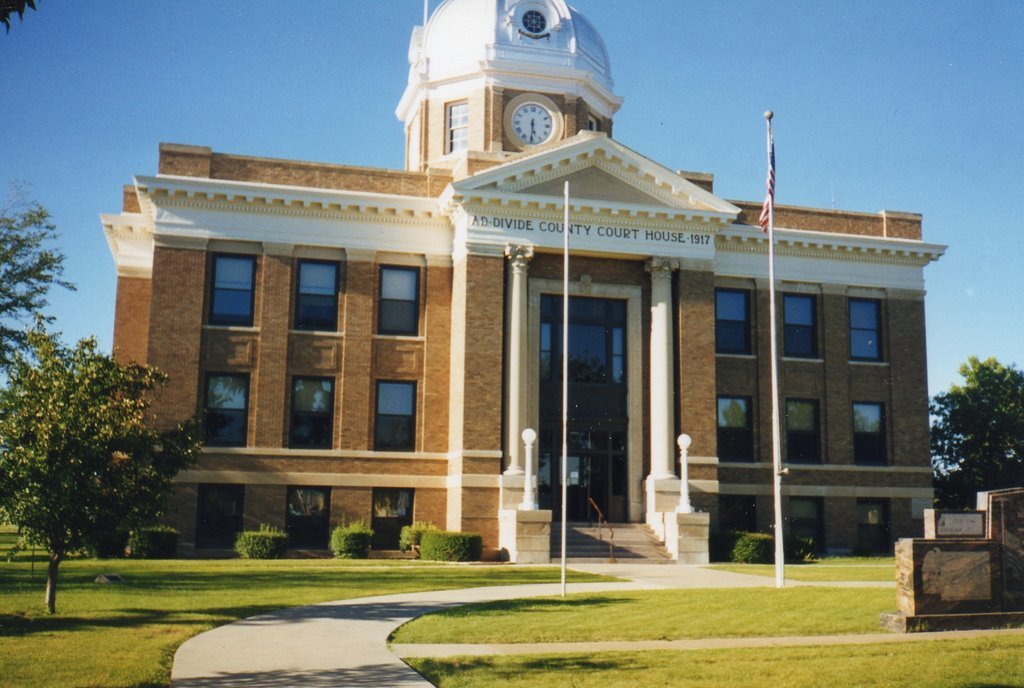Since the founding of our communities, organizations, businesses and citizens have stepped forward to build and serve their community. Click on any of the logos below to learn about those who made this website possible! If you would like to learn about becoming a sponsor CLICK HERE!
Divide County, ND
County in Northwest NDDivide County has the distinction of being one of the latest formed counties of the Homestead era, but evidence left behind at the famed Writing Rock south of Fortuna indicates people have inhabited this land for many centuries. The earliest records by white men show the area was occupied before 1800 largely by the Assiniboine “stone boiler” Indians, a primitive sect of the Sioux.
In 1873, when the territory of Dakota was first created, the future Divide County was included in a large tract known as “Wallette County”. Later, the Northern Pacific Railroad organized and platted two smaller counties to give settlers the impression the area was well-settled. By 1891, the land now known as Divide County was encompassed within the borders of neighboring Williams County.
A well-known Williston attorney in 1910 is credited with coining Divide’s name at the time a vote was held on the division of Williams County. The name recognized the new county’s division from the old, as well as the Continental Divide, which runs through the county from northwest to southeast.
The first homesteaders didn’t arrive until spring 1903, but by the following winter the eastern two-thirds of the county was full of claim shacks. A peak population of 9,637 people occupied the county in 1920.
The main industry has always been agriculture, but natural resources such as coal and oil are also part of the county’s history.
The first wildcat oil venture was launched in 1926 north of Crosby, and mineral leasing hit record levels in 2004, only to be surpassed in 2008 and 2009. After early homesteaders built underground lignite mines, commercial strip mining began in 1930.
In the western half of the county, the federal government played a significant role, choosing a site west of Fortuna for a Cold War radar station. Many present-day residents of Divide County have family ties to the men who served at “the base,” but it outlived its usefulness just as the Cold War era ended.
Today, agriculture dominates Divide County’s economy, but a mix of technology provides good diversity.
In 1993, Crosby established a home-rule charter and, subsequently, levied a local sales tax to encourage economic development.

- County: Divide County, ND
- Region: Northwest ND
Destination Divide County, ND
- Sponsors
- Towns
- Businesses
- Community Organizations
- Faith Organizations
- Festivals and Events
- Points of Interest
- Veterans
Learn how to contribute to any of the above categories.
Towns of Divide County, ND
The small towns of the Midwest are rich in history and a great way of life! Below you can visit and learn about the small towns we call home! Towns that have their name highlighted have become FEATURED TOWNS. Businesses/organizations from these towns have stepped forward as SPONSORS enabling us to include (or will include as acquired) stories and website links to ALL their community organizations (chambers, groups and departments, etc.), stories and website links to ALL their points of interest, annual festivals/events and stories done about their citizens, veterans and faith community. To learn how to become a featured town CLICK HERE!
Businesses of Divide County, ND
The businesses of our towns are truly the lifeblood of each community, click on any businesses below to learn about them, to learn how to add your business to your town and county page CLICK HERE!
